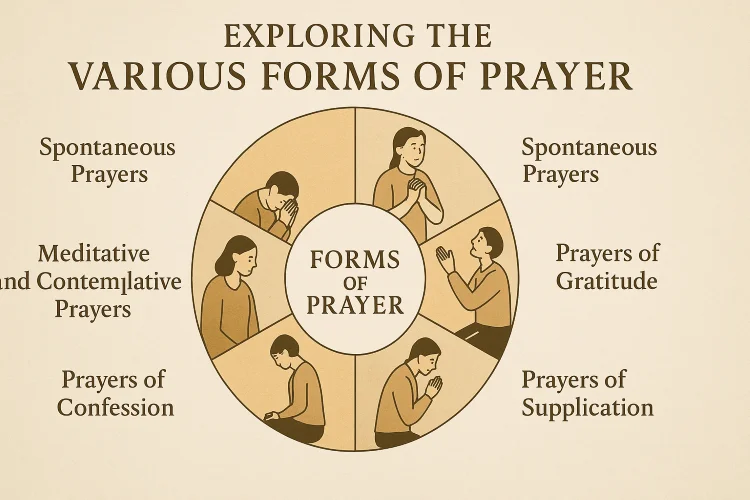
Prayer is one of the most powerful tools in a Christian’s spiritual journey. It is more than just words spoken into the air; it is an intimate conversation with God, a way to align our hearts with His will, and a channel for divine guidance and peace.
In today’s fast-paced world, it’s easy to neglect this vital connection.
However, understanding the essence of prayer can help reignite its significance in our daily lives. Whether you prefer structured prayers, spontaneous conversations with God, or silent meditations, all forms of prayer play a role in fostering a deep and personal relationship with our Creator.
The practice of prayer has evolved over time, yet its purpose remains the same—to seek God’s presence, guidance, and intervention. By revisiting the rich history of prayer, we can find inspiration from biblical figures and spiritual leaders who demonstrated unwavering faith through their prayers.
Exploring the Various Forms of Prayer

Prayer comes in many forms, each serving a unique purpose in a believer’s life.
By incorporating different types of prayer, we can enrich our spiritual experience and maintain a fresh, dynamic connection with God.
1️⃣ Traditional Prayers
These are structured prayers that have been passed down through generations, such as the Lord’s Prayer. They provide guidance, unity, and a sense of continuity in Christian practice.
2️⃣ Spontaneous Prayers
These are unscripted, heartfelt conversations with God. They allow for honest expression and can be adapted to any situation, making prayer a more personal and immediate experience.
3️⃣ Intercessory Prayers
This form of prayer focuses on lifting others before God. Whether praying for family, friends, or global issues, intercession is a powerful way to seek God’s intervention on behalf of others.
4️⃣ Prayers of Gratitude
These prayers emphasize thankfulness and appreciation for God’s blessings. Gratitude in prayer shifts focus from personal struggles to God’s goodness, fostering a spirit of contentment and joy.
5️⃣ Prayers of Confession
Confession allows believers to acknowledge their sins, seek forgiveness, and restore their relationship with God. It is a vital aspect of spiritual renewal and humility before the Lord.
6️⃣ Prayers of Supplication
Also known as petitionary prayers, these involve bringing personal needs and requests before God. They reflect dependence on God’s provision and His ability to meet our needs according to His will.
7️⃣ Meditative and Contemplative Prayers
These involve silent reflection, listening for God’s voice, and meditating on His Word. Such prayers deepen spiritual awareness and create a space for divine revelation and guidance.
Each form of prayer serves a unique function in a believer’s life, contributing to a well-rounded and meaningful prayer practice.
Tips for Effective Prayer: Unleashing the Power Within
Prayer is most powerful when it is intentional and heartfelt. Here are some key ways to make your prayer life more effective:
? Pray with Intention
Approach prayer with a sincere heart, clearly expressing your gratitude, requests, and praises to God. Focus on meaningful communication rather than routine repetition.
Praying with intention allows you to align your desires with God’s will and strengthens your faith in His plans.
? Create a Conducive Prayer Environment
Designate a quiet and comfortable space where you can focus and eliminate distractions.
Whether it’s a dedicated prayer room, a peaceful outdoor spot, or a simple corner in your home, having a set space can enhance your ability to concentrate and connect with God more deeply.
? Incorporate Gratitude and Confession
Expressing thankfulness reminds us of God’s blessings and reinforces a spirit of contentment. Confession, on the other hand, allows us to cleanse our hearts, seek forgiveness, and renew our relationship with God.
Together, these elements foster a humble and open prayer life.
? Establish a Consistent Prayer Routine
Whether through morning devotions, bedtime prayers, or spontaneous moments throughout the day, consistency fosters a habit of seeking God in all circumstances.
Setting aside specific times for prayer—such as before meals, during a commute, or after reading scripture—can help integrate prayer seamlessly into your daily routine, making it a natural and indispensable part of your life.
Scriptures About Prayer: Divine Words to Guide and Inspire
The Bible is rich with teachings on prayer, providing wisdom and encouragement to those who seek God through it:
 ✅ Matthew 6:6
✅ Matthew 6:6
“But when you pray, go into your room, close the door and pray to your Father, who is unseen. Then your Father, who sees what is done in secret, will reward you.”
This verse emphasizes the importance of private, sincere prayer. It teaches us that prayer is a personal connection with God, not a public performance, and that God rewards those who seek Him with humility.
✅ Philippians 4:6
“Do not be anxious about anything, but in every situation, by prayer and petition, with thanksgiving, present your requests to God.”
This verse reminds us that prayer is an antidote to anxiety. By bringing our concerns to God with a heart of gratitude, we can experience His peace, knowing that He is in control.
✅ James 5:16
“The prayer of a righteous person is powerful and effective.”
This scripture highlights the strength of fervent, righteous prayer. It reassures believers that their prayers hold great power when offered in faith and righteousness, often bringing about healing, deliverance, and transformation.
✅ Luke 18:1
“Then Jesus told his disciples a parable to show them that they should always pray and not give up.”
Here, Jesus underscores the need for persistence in prayer. This verse teaches us that continuous prayer builds faith and that we should never lose heart, even when answers seem delayed.
Discussion on the Words of Jesus Regarding Prayer in the New Testament
Jesus spoke extensively about prayer, offering guidance on how believers should communicate with God. He emphasized sincerity, persistence, and faith.
In Matthew 6:9-13, He provided the Lord’s Prayer as a model, illustrating the key components of effective prayer—worship, submission to God’s will, dependence on His provision, forgiveness, and deliverance from temptation.
Additionally, in Luke 11:5-13, Jesus taught about perseverance in prayer through the parable of the persistent friend, reminding us that God rewards those who seek Him with steadfast faith.
Reflecting on Biblical Figures Known for Their Prayer Lives

The Bible presents many individuals whose prayer lives had a profound impact on their circumstances and faith journeys:
1️⃣ Daniel
Known for his unwavering commitment to prayer, Daniel continued to pray three times a day despite the threat of persecution (Daniel 6:10). His faithfulness led to divine protection and miraculous deliverance.
2️⃣ Hannah
In her deep distress, Hannah fervently prayed for a child, and God answered her plea, blessing her with Samuel, who became a great prophet (1 Samuel 1:10-20).
3️⃣ Elijah
Through passionate and faith-filled prayer, Elijah called down fire from heaven and later prayed for rain after a drought, demonstrating the power of a righteous person’s prayer (1 Kings 18:36-38, 42-45).
4️⃣ Jesus
The ultimate model of prayer, Jesus frequently withdrew to pray, emphasizing its importance in His relationship with the Father. His prayers in Gethsemane (Luke 22:39-46) reveal deep surrender to God’s will, setting an example for believers to follow.
By studying these biblical figures, we can learn valuable lessons about faith, perseverance, and the transformative power of prayer.
Conclusion & Encouragement: Cultivating a Vibrant Prayer Life
Developing a strong and consistent prayer life requires patience, faith, and dedication.
While answers may not always come immediately, God hears every prayer, and His timing is perfect. Prayer not only brings personal transformation but also strengthens communities and relationships through collective faith and intercession.
As you continue your prayer journey, embrace the peace that comes from trusting God with your burdens, joys, and desires. May your prayer life be a source of strength, comfort, and spiritual renewal.
We invite you to share your experiences and insights on prayer in the comments. How has prayer impacted your life? What are some ways you have deepened your communication with God?
Let’s grow together in faith and encourage one another in this journey of prayer!

It was interesting to read that there are different types of prayer. For me, the most common would be spontaneous and gratitude. I try and make it a habit to thank the Lord for all that I have, as some have so much less than I.
I think that Meditative and Contemplative Prayers must be quite difficult, especially if you have a busy mind. I know that I have tried meditation before and that is much harder than it looks. How would you go about improving the way that you communicate with God? There must be a way to sort of train for this.
Hi Michel,
Thank you so much for sharing your thoughts! I truly appreciate how you’re cultivating a habit of gratitude in your prayer life — what a powerful and beautiful way to stay connected with God.
You’re absolutely right; many people have far less, and choosing to thank the Lord regularly not only honors Him but also deepens our contentment and joy.
Yes, meditative and contemplative prayers can be quite challenging, especially in today’s fast-paced world and with a busy mind. I can relate!
As I mentioned in the post, these types of prayer require slowing down and truly being in God’s presence — not rushing, not speaking too much, but simply resting in Him and listening.
One way to “train” or grow in this is to start small. Just set aside a few quiet minutes each day, maybe right after reading Scripture, to reflect on a verse or simply focus on who God is.
Don’t worry if your mind wanders — gently bring it back to Him. Over time, it becomes a sacred rhythm that not only strengthens your communication with God but also quiets your soul.
Remember, prayer isn’t about perfection — it’s about relationship. And God delights in every effort we make to draw near to Him.
God bless you, Michel, as you continue growing in your walk with the Lord!
Dear Alice,
What a beautiful and uplifting post on praying with power!
Your biblical insights about approaching prayer with faith and persistence truly deepen my understanding of how to connect with God more meaningfully.
Thank you so much for spreading the Good News through this inspiring guide—it’s a blessing to read, and I hope you keep sharing such wisdom!
I was wondering: for someone who struggles with feeling confident in their prayers, what’s one practical way they can start building that sense of trust in their prayer life?
Thanks again for this wonderful encouragement!
Sincerely,
Steve
Dear Steve,
Thank you so much for your kind and encouraging words! I’m truly grateful that the post blessed you and helped deepen your understanding of prayer—that means a lot to me.
Your question is such an important one, and I’m glad you brought it up. Many of us have felt that lack of confidence at some point, especially when we’re just beginning to grow in our prayer life.
One practical way to start building trust and confidence in prayer is to pray using Scripture Start with the Psalms or promises from God’s Word that speak to your heart.
Praying God’s Word not only helps align our hearts with His truth, but it also reminds us of His faithfulness. Over time, as we see how God responds—sometimes in big ways, sometimes in quiet whispers—our trust in Him grows stronger.
Also, remember that God isn’t looking for perfect words. He simply wants a sincere heart. Just come as you are, speak honestly, and trust that He hears you—that in itself is a powerful step of faith.
Thank you again for taking the time to read and share your thoughts. I truly appreciate it, and I pray that your prayer life continues to grow deeper and more joyful!
In Christ,
Alice